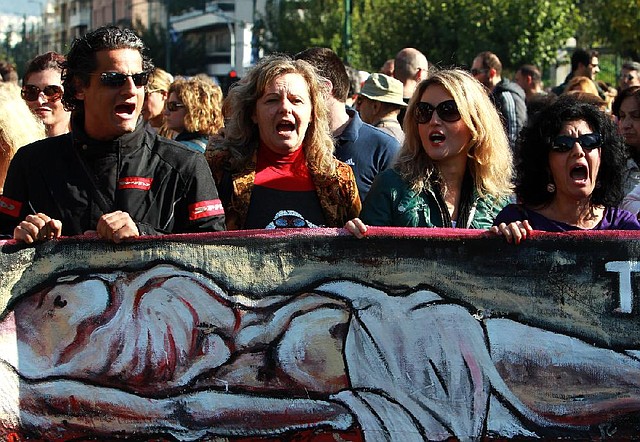Bank, budget changes hard slog for EU
Protesters rally outside the Public Sector Reform ministry on Tuesday in Athens. Civil servants face another round of pay cuts under measures approved by parliament last week.
Wednesday, November 14, 2012
BRUSSELS — European finance ministers inched toward strengthening their banking sectors and the management of their economies at a meeting in Brussels on Tuesday but put off decisions on comprehensive solutions to the region’s financial crisis.
Weakness in the banking sector and inadequate monitoring of national budgets were among the prime causes of Europe’s threeyear crisis, which has seen several countries struggle with too much debt. Fixing those areas is crucial not only to ending the current crisis but also preventing a repeat.
European leaders have agreed, in theory, to cede significant amounts of sovereignty to fix those problems. As part of this plan, the European Central Bank will be put in charge of all of the banks in the 17 countries that use the euro by as early as next year. And they have proposed giving the European Commission, the European Union’s executive arm, the power to review and even reject their national budgets to prevent against overspending.
But actually implementing those ideas has proved difficult. Germany, for instance, is wary of ceding control over its banks while Britain is nervous that a coordinated eurozone banking sector will have a greater say in discussions over regulations that apply to all 27 nations of the EU. And several countries are concerned about the voter backlash that would be sparked by handing too much power to the Commission.
After months of heightened activity over banking and economic oversight — a move that markets and investors have largely welcomed — it seems the EU has now put on the brakes while it hammers out the details.
Austrian Finance Minister Maria Fekter said creating a single supervisor for all the banks may require a timeconsuming treaty change. That would knock the EU way off its timeline of getting a supervisor at least partially in place next year.
“I don’t want to speed up without having discussed the best solution,” she said. “Speed kills when we don’t have the best solution.”
It’s unclear how long markets will wait, though. Official figures due later this week are expected to show the eurozone fell into recession — technically defined as two consecutive quarters of economic contraction — in the third quarter. Even the German economy, the continent’s largest, is slowing, as was evident in an unexpected drop in investor confidence reported Tuesday.
“There is still the same lack of urgency that has sent the markets into a frenzy on numerous occasions in the past few years,” said James Hughes, chief market analyst, for Alpari.
Meanwhile, Greece raised $5.15 billion on Tuesday from the sale of short-term treasury bills, money that will help it make a crucial debt repayment at the end of the week.
With the disbursement of a $40.1 billion installment from Greece’s international bailout long delayed, the country’s finances have gone down to the wire. Without Tuesday’s sale, Athens would have found it impossible to repay the $6.4 billion treasury bill maturing on Friday, the day on which Prime Minister Antonis Samaras has said Greece would run out of money.
Despite concerns over Greece’s long-term economic outlook, the country’s euro partners and the International Monetary Fund are expected to agree on the release of the next tranche of the bailout over the next week.
Monday night’s discussions among just the 17 eurozone ministers were also mired in disagreements that have held up the next installment of bailout money for Greece. The discussion faltered over the timeline for bringing Greece’s debts to a manageable level.
The European Commission wants to give Greece until 2022 to reduce its debt to 120 percent of gross domestic product; while the International Monetary Fund wants to stick to the original deadline of 2020.
Officials at the meeting agreed to give Greece until 2016 to make the changes necessary to right its economy and begin reducing its debts. But Greece’s creditors still have to decide how they will pay for the extension and an anticipated additional cost.
German Finance Minister Wolfgang Schaeuble suggested Tuesday that the hole could be plugged by lowering the interest rates of the loans. Economists don’t think that will be enough and have suggested eurozone countries should accept losses on their loans — something Schaeuble ruled out.
Business, Pages 27 on 11/14/2012
